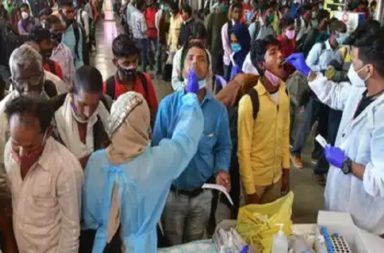International Literacy Day is observed on September 8 every year, to promote awareness about the importance and urgency of education in the world. This year, the focus was on – “Literacy, teaching and learning in the COVID-19 crisis and beyond”. The theme highlights literacy learning in a lifelong learning perspective. The recent COVID-19 crisis has been a stark reminder of the existing gap between policy discourse and reality, a gap that already existed in the pre-COVID-19 era and negatively affects the learning of youth and adults, who have no or low literacy skills, and therefore, tend to face multiple disadvantages.
During the initial phase of the pandemic, schools were closed disrupting the education of 62.3% of the world’s student population of 1.09 billion. Around 773 million adults and young people lack basic literacy skills. 617 million children and adolescents are not achieving minimum proficiency levels in reading and mathematics. The issue of literacy is a key component of the UN’s Sustainable Development Goals and the UN’s 2030 Agenda for Sustainable Development. It promotes universal access to quality education and learning opportunities throughout people’s lives.
Today is #LiteracyDay!
Imagine not being able to read during a pandemic & missing out on life-saving information. For 773 million adults & young people worldwide this is a reality.
More than ever, we must invest in #literacy teaching & learning: https://t.co/bfdlw89q7Y pic.twitter.com/7aVXVWEZgR
— UNESCO (@UNESCO) September 8, 2020
According to the UNESCO’s ‘Global Monitoring Report on Education for All’ (2006), South Asia has the lowest regional adult literacy rate, at 58.6 per cent and the causes for this illiteracy range from severe poverty to prejudice against women. The UN’s Sustainable Development Goal 4 has as one of its targets ensuring all young people achieve literacy and numeracy, and that adults who lack these skills are given the opportunity to acquire them.
International Literacy Day 2020: Key issues
Amid the COVID-19 crisis, children and adult literacy programmes in many places had to be stopped abruptly due to the lockdown. Various UN organisations, which carry out literacy programmes across the world, are exploring key issues like:
- “What is the impact of the Covid-19 crisis on youth and adult literacy educators and teaching and learning?”
- “What are the lessons learnt?”
- “How can we effectively position youth and adult literacy learning in global and national responses and in strategies for the recovery and resilience-building phase?”
By exploring these questions, International Literacy Day 2020 provides an opportunity to reflect on and discuss how innovative and effective teaching methodologies can be used in youth and adult literacy programmes to face the pandemic and beyond. The Day also allows analysing the role of educators, as well as formulate effective policies, systems, governance and measures that can support educators and learning.
The Ministry of Education posted a quote of Prime Minister Narendra Modi and wrote, “…we promise to work towards achieving 100% literacy…”.
"There can be no joy greater than reading and no friend greater than knowledge" Hon'ble PM Shri @narendramodi
On this #InternationalLiteracyDay, we promise to work towards achieving 100% literacy by complying with the reforms within the #NationalEducationPolicy2020. #ShikshakParv pic.twitter.com/9A0D7euVyl— Ministry of Education (@EduMinOfIndia) September 8, 2020
What Is World Literacy Day?
The 8th of September was proclaimed International Literacy Day by UNESCO in 1966 to remind the international community of the importance of literacy for individuals, communities and societies, and the need for intensified efforts towards more literate societies. The issue of literacy is a key component of the UN’s Sustainable Development Goals and the UN’s 2030 Agenda for Sustainable Development. The UN’s Sustainable Development Agenda, adopted by world leaders in September 2015, promotes universal access to quality education and learning opportunities throughout people’s lives. Sustainable Development Goal 4 has as one of its targets ensuring all young people achieve literacy and numeracy and that adults, who lack these skills are given the opportunity to acquire them.





